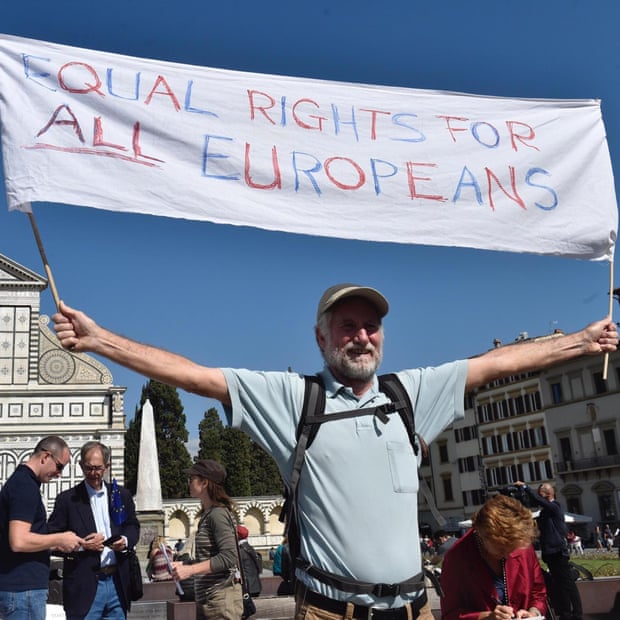It was March 2016 when 21-year-old Alina arrived in London from Poznań, Poland, and moved into a shared room in east London. Her roommate was a Romanian woman whose alarm rang at 4am every day, so she could go to clean offices in Canary Wharf before the other employees started in the morning. Alina asked her where she could find work and, within a week, had an interview with a cleaning agency whose main clients owned expensive residences in central and west London. She was told that she would start off receiving £25 in cash for each apartment she cleaned, as well as half her travel expenses, and they would talk about a more formal contract if she decided to stay on. Alina’s plan was to save enough money to rent her own room.
Days later, she received a text message with the address of her first job, which led her to a three-bedroom flat in Marylebone, one of those with “white pillars and big balconies”, she says. Inside, she found towers of filthy plates and piles of dirty clothes. “The place was covered in dust and crap. The guy who owned the place hadn’t lived there for almost a year, but was coming back for the summer and it needed a ‘spring clean’ – it took me hours.”
Alina was soon cleaning two or three apartments a day. When she received her first pay packet – a bundle of notes tied together with a hairband – she calculated that she had been paid an average of £15.50 for each flat, with no contribution towards travel costs. “I mentioned this to someone from the agency and was told it was just because this was my first month, and that it would be right next time.”
But this happened on the second month as well. Then on the third and fourth, too, with each pay packet amounting to a different sum, all significantly below the £25 an apartment she had initially agreed. The man who had interviewed her had moved to Prague and there seemed to be no accountable person to go to for decisions on pay. “I found it really hard to complain. I never met the person organising the pay – there were always different people who gave me the money and I never met anyone else who worked for them, so didn’t know if it was happening to other people.” When September came, she decided it was time to find another job. “I told them I was leaving and asked if they could give me a reference – and the woman on the phone just said: ‘Remember, you’re Polish. You won’t be able to find other work.’ She had never said that before and it worried me.”
Q&ABrexit phrasebook: what are citizens' rights?
Show

Citizens’ rights are the rights and protections offered to all EU citizens, including free movement and residence, equal treatment and a wide range of other rights under EU law regarding work, education, social security and health.
They are held by some 3.5 million citizens from other member states in the UK and about 1.2 million British nationals on the continent, and are a key part of the negotiations that are taking Britain out of Europe.
A few days after this conversation, Alina received a phone call from someone at the agency asking if she had a permanent residence card (PRC), which people can apply for if they have lived in the UK for five years. She said no. “I was told it would be very difficult to find other work without one. I was also told I had no payslips, so it would be hard to show I had been working.” Compared with the prospect of no work at all, being underpaid didn’t seem so bad, so Alina stayed.
When Alina began her cleaning job in London, she had been unsure about her rights as a worker and how to assert them, but the confusion of summer 2016 and the Brexit referendum led her to believe she might not have any rights at all. Her experience illustrates how the government’s lack of clarity on the status of EU nationals has affected individuals since Brexit negotiations began. In a recent joint statement, the UK’s Confederation of British Industry and the Trades Union Congress said: “After 15 months of human poker, the uncertainty facing 4 million European and UK citizens has become intolerable. It is a blight on the values of our nations … a clear guarantee of the right to remain for citizens in both the UK and EU27 is needed within weeks.”
The London-based charity Focus on Labour Exploitation (Flex), which works to end unscrupulous employment practices, has been investigating the extent of the discrimination that many like Alina have experienced after the referendum. Its report, written on behalf of the Labour Exploitation Advisory Group (LEAG), a collection of organisations working with potential and actual victims of illegal employment practices, shows that Brexit has made many workers more vulnerable to exploitation. Flex’s director, Caroline Robinson, says the uncertainty “is undermining EU migrant workers’ confidence in their rights and status, and is making it more difficult for them to speak out against abuse. Clear information is urgently needed from the government to prevent unscrupulous employers from taking advantage of the fear and confusion felt by many workers.”
The report quotes Katarzyna Zagrodniczek from the East European Resource Centre (EERC), who describes one case in which a team of 10 Polish builders had been working on a site where the manager gave them inaccurate instructions that caused them to build a ceiling at the wrong height. “He wanted to sack those people without paying them despite the fact that it wasn’t their fault. When they started asking for the money, he told them where to go because they were Poles. He wasn’t going to deal with them and he wasn’t going to pay them.” The situation was left at that.
The fact is, nothing has changed, from a legal point of view, for EU citizens in the UK since June 2016. But a febrile atmosphere has developed. “These aren’t legal issues, they’re social ones,” says the immigration barrister Colin Yeo, who founded the legal advice website Freemovement.org.uk. “If you’re an EU citizen, you do not need a permanent residence card to work – and I think it would be discriminatory for people to ask for that. All you need is your passport.”
Permanent residence is something that an individual automatically acquires after five years of exercising EU law rights as a worker or student, and this can be evidenced by a permanent residence document. But the absence of clarity, and the demands of some employers, have led many people to apply for one. According to the Office for National Statistics, the numbers of decisions made regarding PRCs have increased fivefold since the prospect of Brexit began to take shape in 2015.
“For many reasons, we want to confirm our status here as the government has offered us no certainty to our futures,” says Axel Antoni, a spokesman for the campaign the3million, a not-for-profit group that campaigns to preserve the rights of EU citizens in the UK, and those of British citizens in Europe after Brexit. “The government has deterred people from making applications [for PRCs] simply because it is too much work for them, but what they don’t seem to care about is that this uncertain climate has meant many people feel they now have to prove their status to assert their rights – especially those with shady employers.”

Antoni says many EU citizens will not have fulfilled the requirements needed for a PRC. “Even if they have lived in the UK for five years, people with cash-in-hand jobs, working freelance or with gaps between work may find obtaining a PRC difficult, which is why so many applications have been rejected. It is hard for them to prove they have worked here.” In the last two quarters of 2016, around 28% of applications were turned down, although the Home Office has said “applications can be rejected for a whole range of administrative reasons, including where an application form has not being signed or failure to pay a fee”.
The European commission president, Jean-Claude Juncker, has expressed disbelief that Britain did not guarantee from the start that everything would remain the same for the 3 million EU citizens after it leaves. “The government’s ‘bargaining’ has created a climate of uncertainty and it is causing a lot of problems,” says Antoni. “We are campaigning for ‘presumed’ status as opposed to ‘proven’ status as the difference between the two has meant many in already insecure positions are now at risk of being exploited.” By telling people such as Alina that they need a PRC to work, while keeping them in a position that will prevent them from obtaining one – for example through cash-in-hand payments – employers are essentially trapping their workers.
The home secretary, Amber Rudd, has announced that registration for “settled status” of 3 million EU nationals in Britain will begin by the end of next year. “All this does is provide another 14 months of uncertainty,” says Antoni. “Look at what that has done so far.”
According to the Flex report, the EERC found that the demand for advice services had increased by 734% after the UK’s vote to leave the EU. The main concerns people had were about immigration status and labour rights. Many member organisations also received multiple cases of workers calling for advice because they were being told by colleagues or employers that they were “not a legal worker any more”.
At the start of this year, Artur left his home in Lithuania to seek work in the UK. Shortly after arriving, he was offered some construction work at a site in Wales, where he was told he would have a place to live, receive the minimum wage and work eight-hour days. It soon became clear this wasn’t the case. His new home was a cramped caravan, which he had to share with five other Lithuanian workers. “I thought about trying to get a train to Newcastle where I have some friends, but I couldn’t even afford that. By the time the money for my travel, my home and my food had come out there was hardly anything left,” he says.
“My boss would start saying things like: ‘What are you going to do? You don’t know what’s going to happen to you.’ He’s right. I have no idea what will happen to me – I don’t know if I’m legal. So we stayed.”
“The UK government has been so unwilling and unable to offer proper assurances that people are getting confused,” says Yeo. “They will be fine in the future if they follow instructions and meet whatever the criteria are that the Home Office eventually announces – but we do not know about them at the moment.”
When asked for a response, a government spokesperson said: “Britain has some of the strongest anti-discrimination laws in the world and we will not tolerate prejudice against EU workers. The prime minister has made clear that safeguarding the rights of EU citizens living in the UK and UK nationals living in the EU is a priority and we are within touching distance of agreement.”
The demands for services and documentation further underline the missing link in the chain of communication, which, according to Barbara Drozdowicz, CEO of the EERC, has led to two big problems. “There are some employers who think [the PRC] is needed,” says Drozdowicz. “There are cases of employers where the job offer is dependent on the residence card. People are worried that they will hire someone and they will have to leave, which isn’t true, but shows employers are badly informed.”
“The other side is that there are employers who I believe now want only eastern European workers because they can treat them badly and threaten them with false information, knowing they will stay. We see this a lot in unregulated work such as cleaning and construction. Cash-in-hand jobs tie people to employers and mean it is harder to get the documentation they need to have workers’ rights.”

“We have been running for years now and have always had people come to us asking for help with exploitation, especially workers in low-paid jobs such as cleaning and caring. What this referendum has done is given exploitative employers more control.”
The Latin American Women’s Rights Services (LAWRS) works with a lot of women who migrated to mainland Europe from South American countries in the turbulent 80s. In Europe, they were later hit by the 2008 economic crisis, leading them to migrate for a second time, to the UK. Lucila Granada at LAWRS works with many of these women and says there has been a huge increase in people feeling trapped at work. “There is this implicit assumption now that people can’t complain. We’ve had women come to us saying their line managers have said to them things like: ‘You should behave because you have a European passport.’ They are then asked to clean an extra room for the same money. “The people we see have already been displaced by political instability. Many of them came into lower-paid sectors and are a little older and have dependents. They are already very vulnerable.”
Granada says that part of the reason workers such as cleaners suffer is that their services are often outsourced, meaning they are removed from the person paying them. “There is so little information about the cleaning sector. It’s so rare that the cleaners are paid by the people who own the place they are cleaning. A lot of times, they don’t know who their employer is, the legal name of the company. Nothing. So it is hard for them to complain and easy for people to take advantage.”
Alongside a growing feeling of being trapped in exploitative work, both LAWRS and the EERC have reported a huge increase in hate crime, discrimination and hostility towards the migrant communities with whom they work. An internal survey by the EERC found that 19% of service users had experienced hate crime since the June 2016 referendum and a further 20% knew someone who had. One participant described “being told to shut up because they were going to be deported soon and that they soon would become illegal”. Incidents in workplaces ranged from discrimination linked to being a European national – “Being treated differently [and] told: ‘You don’t know how long you’ll get to stay here,’ being pushed around by bosses or by colleagues” – to not being paid, and even physical attacks.
In the Flex report, the EERC shared this experience: “We had a man working in a restaurant and the owner attacked him with a knife telling him to ‘fuck off to Poland’. This man decided that staying in employment is more important than reporting the case to the police.”
According to both Drozdowicz and Granada, it is those already in unregulated work who will feel the effects of Brexit the most. “These are the jobs people don’t want to do and this is why – they’re hard work and you have no control over how you’re treated.”
Margaret Beels, who chairs the Gangmaster and Labour Abuse Authority (GLAA), says: “People have gone from being unsure about their rights to being tricked into thinking that they have no rights at all. By adding yet another layer of uncertainty, Brexit has made it even easier for people-trafficking and slavery to take place and given more leverage to the organised crime gangs who run it.”
“From experience, we know that exploitative employers and criminal gangs will use any means possible to take advantage of individuals. Brexit has just offered them yet another way of doing that to another group of people.”
“Lots of small changes started to happen and now I feel too trapped to leave,” says Alina. These small changes add up: not being reimbursed for the cleaning products she uses; fewer notes in her wad of cash at the end of each month; the promise of travel payments never being fulfilled. “Sometimes my pay amounts to half of what I’m owed. It just seemed to get more unfair and harder to say anything.”
As for her roommate, she says they rarely talk, as the rhythm of their work patterns means one is always asleep when the other returns. Alina says she always wondered why the woman in the opposite bed still had to share a room when she worked every day. “Now I get it.”
Names have been changed.

Comments (…)
Sign in or create your Guardian account to join the discussion